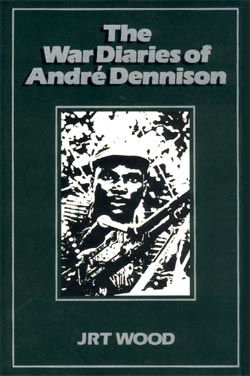
The War Diaries of André Dennison
When the Rhodesian Army recruited André Dennison in 1975, it could not have chosen better. It secured the services of a hardened veteran of four of the minor wars of the 1950s and 1960s - the Suez débâcle; the Cyrpus Emergency; the confrontation with Indonesia as well as events as we have seen them in Northern Ireland. Dennison had been a paratrooper, a member of the SAS, a company commander and a training officer. He had served with the Malawi Rifles and had gained experience with African troops. Thus he was the most appropriate choice asd the first Officer Commanding f 'A' Company of the new 2nd Battalion of the Rhodesian African Rifles.
André Dennison quickly acquired the reputation of being one of the most forceful of the Fire Force commanders. He kept a meticulous record of the daily life of his 'A' Company, writing up his war diaries every night and eventually, when convalescing from wounds, transcribing them into a single volume. He wrote in the dry, humourous style of the professional soldier, sparing little pity for his enemy while displaying deep affection and admiration for his men as he chronicled their exploits. He was diffident about his own achievements which were to win him three awards for bravery.
André Dennison affords the reader a unique insight into the life of a black infantry company in the traumatic last five years of the long insurgency war in Rhodesia. Dennison's text is enriched by contributions from the records of the Selous Scouts supplied by Lieutenant-Colonel Ron Reid-Daly. Accordingly, when Dennison writes of being called out by the Scouts to a sighting, Reid-Daly reveals the background to the incident and, in many instances, adds to the outcome. Ron Reid-Daly also provides a review of the use of Fire Force, that potent combination of helicopters, paratroops and infantry.